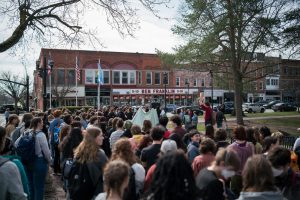Political Face-Offs Supersede Philippine Drug Crisis
September 9, 2016
Philippine President Rodrigo Duterte brought his nation into the international spotlight this week by slandering U.S. President Barack Obama, calling him a “son of a whore.” I am hugely disheartened by Duterte’s justification of his attack on the U.S. president, as well as Obama’s response of cancelling his meeting with Duterte.
Obama was supposed to meet with Duterte Tuesday in Laos to discuss drug-related extrajudicial killings in the Philippines. When Duterte was running for president, he made a promise to eradicate both drug dealers and users in his country. Since his inauguration June 30, over 2,400 people have been killed by extrajudicial means, which means that governmental authorities have killed people without the sanction of any judicial proceeding or legal process. The youngest reported victim of these killings was a 5-year-old girl, who was eating lunch when gunmen fired into her family’s home. The perpetrators were targeting her grandfather.
Duterte said that he is a president of a sovereign state, one that had long ceased being a colony. “I am not answerable to anyone except the Filipino people,” he said to reporters Monday before flying to Laos.
The irony in his lines is almost as shocking as when he insulted Obama. A little known historical fact is that past presidents of the Philippines were not only friendly with U.S. presidents, but they have all been puppets of U.S. political will, economic intervention and military occupation. Duterte claims that the Filipino people are his master. But he acts like a tyrant with his militarized resolution against drug issues in the Philippines while also denying a history of U.S. imperialist relationships — a relationship that is still very strong today.
U.S. imperialism in the Philippines is often an obscured history. The Philippines became a U.S. colony after Spain ceded the nation in the 1898 Treaty of Paris. In furtherance of an imperialist agenda, there was significant interaction between U.S. corporations and leaders and those with socioeconomic and political power in the Philippines. As the Philippines still exists as a semi-feudal society, it has been especially easy for such exploitation to occur. In particular, the U.S. has helped increase militarization and military training in the Philippines.
Now, Duterte is taking advantage of that militarization by mobilizing soldiers against the population, whether guilty of drug involvement or not. Meanwhile, Obama has called off his meeting with Duterte. As a Filipino-American woman, I am dispirited by these reactions. Although political and military corruption in the Philippines is nothing new to me, watching Obama turn away from his meeting with Duterte felt like a form of abandonment. I felt betrayed knowing the prospect of this could have sparked a new dialogue between the Philippines and the U.S. concerning military use and imperialist relationships. At the same time, I am reluctant to forgive U.S. leaders for giving the Philippines the means to kill its own people.
This story is covered in layer after layer of irony. The Filipinx American Student Association on campus is celebrating Filipino American Heritage Month this October. However, the leaders of the two nations we associate with — the Philippines and America — are ones we are currently critical of and are not celebrating. In the face of political posturing and attempts to one-up each other, Duterte and Obama are only focusing on themselves and not the people who are continual victims of militarization, imperialism and governmental corruption: the Filipinx people.
FASA stands in solidarity with the victims of extrajudicial killings in the Philippines. Come this October, we will celebrate Philippine heritage and its people, not the leaders who destroy them.

























